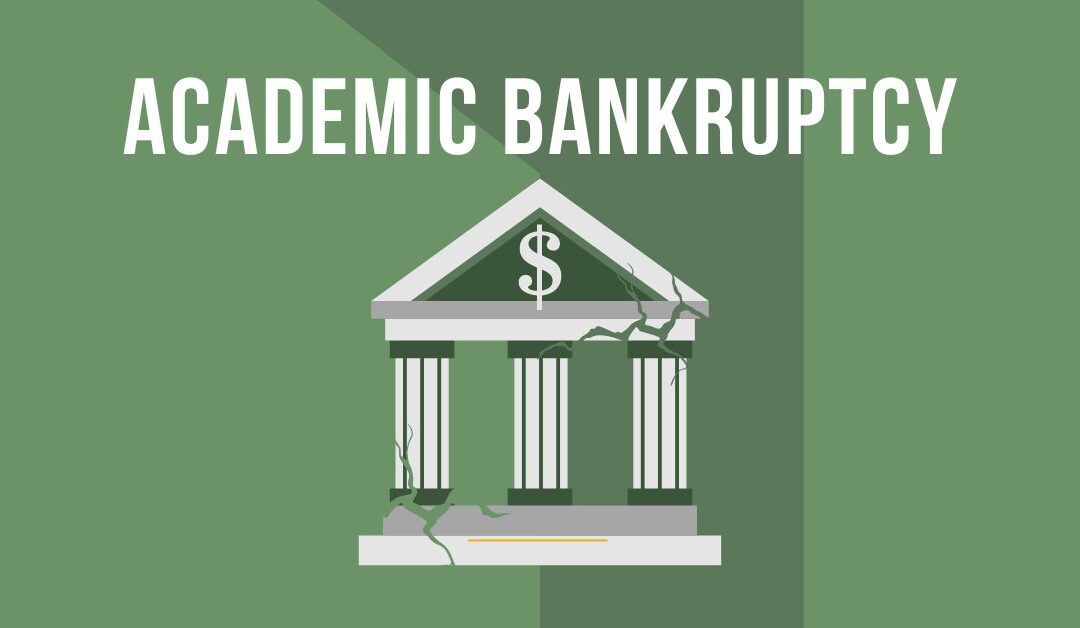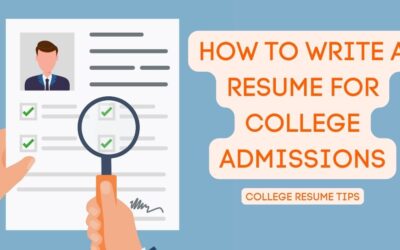by Matt B | Mar 12, 2023 | Transfer Student Resources
Have you ever been so overwhelmed by school that you wished there was a way to start over and make everything go away? Well, academic bankruptcy could be your ticket to a clean slate and getting back on track in your studies. But what exactly is academic bankruptcy, and how does it work? Let’s explore.
Contents hide
2 What is Academic Bankruptcy?
3 The Benefits of Academic Bankruptcy
4 When Should You Declare Academic Bankruptcy?
5 Different Academic Bankruptcy Policy Guidelines
5.1 Example of Academic Bankruptcy Policy
6 Can You Still Receive Financial Aid if You are on Academic Probation?
Introduction
Have you heard of the term “academic bankruptcy?” It’s a useful concept that can be used to help boost your community college GPA. When you declare academic bankruptcy, it erases all grades earned during a specific period of time.
Academic bankruptcy, also referenced as “academic amnesty,” is an excellent tool for those who have gone through an academically challenging period and need a fresh start!
Have you ever faced a situation where one bad semester due to medical, personal, or any other reasons puts your entire academic standing at risk? If so, declaring that particular semester ‘bankrupt’ could be the ideal solution for you!
This remarkable strategy enables students to ignore the grades from their poor-performing semester and instead repair as well as improve their cumulative GPA, thus saving the student’s academic career.
It is difficult to pinpoint the exact time length because every institution has different policies regarding academic amnesty.
Some institutions require students to have been out of college for more than two years before they can deem any of their previous coursework as “bankrupt.”
Other institutions, however, look at the student’s transcript and will take into account the developmental courses, degree requirements,
Related: Is Withdrawing From a Class Bad? | Consequence of a “W” on Transcript
What is Academic Bankruptcy?
Academic bankruptcy is a process for college students who have earned poor grades in their classes or have struggled with their coursework.
It provides an opportunity for students to start over academically by removing all of their past grades from the record. Essentially, it’s like hitting the reset button on your academic record.
Students generally request academic bankruptcy through the institution’s dean’s office or through the registrar’s office.
The Benefits of Academic Bankruptcy
Academic amnesty has several benefits for students who are struggling in their studies. It can provide a fresh start and allow them to focus on doing better in their classes going forward.
It also allows students to take more challenging courses without worrying about the strain they will place on their GPA. Finally, it can help eliminate feelings of stress or anxiety associated with previous bad grades.
When Should You Declare Academic Bankruptcy?
In general, academic amnesty should only be considered as a last resort when all other options have been exhausted.
Undergraduate students will have to identify complications regarding their official transcript, grade point average, and the number of credits earned prior to the academic bankruptcy declaration.
Most colleges require students to go through counseling or pass specific courses before they are eligible for academic amnesty, so it is essential to consult with an advisor first before making any decisions.
Recommended Reading: What Happens if You Mess Up in Community College?
Additionally, many schools do not offer this option at all, so make sure to check with your college before proceeding with any plans for academic amnesty.
Different Academic Bankruptcy Policy Guidelines
Academic bankruptcy may differ widely between higher education institutions. Some schools may allow students to declare academic bankruptcy, while others do not.
The type of academic bankruptcy program available and the process for filing can also vary widely among schools.
Academic bankruptcy declared at one institution will be evaluated on an individual basis, especially if a student is attempting to declare bankruptcy on coursework that is outside the scope of the academic bankruptcy form.
Recommended:
MSSU Academic Bankruptcy Form
Students should familiarize themselves with the academic bankruptcy program of any institution they plan to attend so that they understand what their options are in the event that their academic performance is suffering.
Additionally, different conditions may apply when academic amnesty is granted; understanding these stipulations ahead of time can help a student make an educated decision when it comes to continuing or abandoning their academic pursuits at a given institution.
Example of Academic Bankruptcy Policy
At Missouri Southern State University (MSSU), the guidelines for declaring academic bankruptcy are clearly defined on their Academic Bankruptcy Policy Form
If a student wishes to have one of the semesters they attended Missouri Southern State University disregarded from their academic transcript, they can submit an application for Academic Bankruptcy with the MSSU committee.
Once approved, all of that semester’s grades and credits will be removed from their GPA calculation as well as any hours or quality points completed during that period.
The transcript of the bankrupted courses will still reflect all course work with an “E” indicating that they won’t contribute to the student’s GPA or earned hours in courses.
Before a student can successfully petition for Academic Bankruptcy, they must provide specific details about the exceptional circumstances that warrant this action. Additionally, each undergraduate is limited to one approved request during their college career.
Furthermore, a notation of Academic Bankruptcy for that particular semester will be included on the student’s final transcript. Academic bankruptcy may only be declared one time, as noted previously, and the decision cannot be reversed.
Bear in mind the degree requirements for your major and whether declaring academic bankruptcy will ruin financial aid or college course credit earned in previous semesters.
It’s worth noting, however, that academic amnesty cannot be used in any way as leverage for obtaining either academic honors or athletic eligibility.
Can You Still Receive Financial Aid if You are on Academic Probation?
To determine whether you qualify for financial aid, your college considers a concept known as Satisfactory Academic Progress (SAP).
Each college has their own specific criteria for SAP that are outlined in the Student Handbook and can be calculated using a combination of grade point average and classes completed per semester or year-long periods.
Failure to meet required SAP standards will disqualify a student from federal aid until they are back in compliance, leaving self-payments as the only payment option.
Related: When do UC Decisions Come Out? Announcing 2023 UC Decision Dates
Furthermore, it is vital to read any information regarding academic probation provided by the Student Handbook.
Academic bankruptcy may depend on formal interviews and consultations regarding the bankrupt semester the student intends to eliminate.
Conclusion
Academic bankruptcy may help struggling students get back on track academically and provide them with a fresh start if they need one.
However, it should only be used as a last resort after consulting with an advisor and making sure that the option is available at your college or university.
With careful consideration and planning, academic bankruptcy could be just what you need to turn things around in your studies!
Related Posts
Search
Read Our Articles
Does Class Rank Matter in College Admissions? Exploring the Pros and Cons
The Associate Degree for Transfer: Your Gateway to a Four-Year University
San Diego City College to Offer Bachelor’s Degree Starting in Fall 2024





